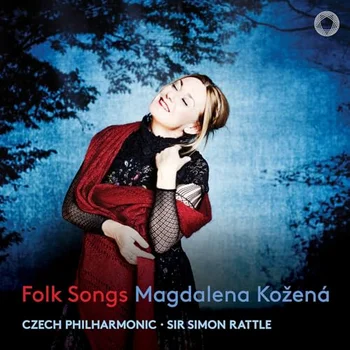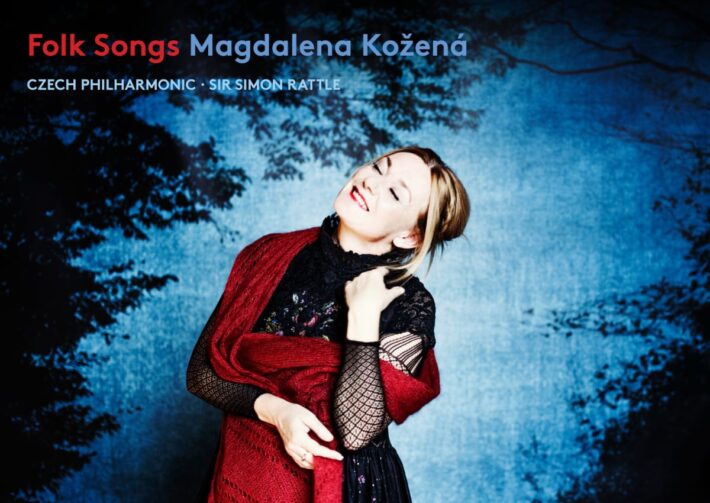Magdalena Kožená’s recorded catalogue includes several albums exploring the intersection of folk and classical music. That exploration continues here, with music by Bartók, Berio, Ravel, and Montsalvatge. Kožená’s voices retains most of its youthful luster, a slender yet warm coloring. The chest voice is not as plush as other mezzos, but there is impressive evenness of tone throughout all registers. Kožená is a singing actor, expressing the words and inhabiting the characters and emotional moods of the music.

Bela Bartók‘s “Hungarian Folksongs” (Sz101) were written for the eightieth anniversary of the Budapest Philharmonic Society in October 1933. By this point Hungarian folk music was fully synthesized into his compositional style. Each folk tune is dressed in sophisticated orchestral garb and Kožená’s singing is consistently captivating, vividly characterized, as is the playing of the Czech Philharmonic. Their richly upholstered sound seems tailor made to this music, where we sense much the composer admired and learned from Richard Strauss. There were times, for instance in the final moments of the first song (In Prison) where I thought the focus was on sheer beauty of sound rather than text – but listen to how the playing captures the prisoner’s attempts to comfort his wife and children, as he urges them to “be cheerful…don’t be tearful! God takes all your cares upon him.” And in the final song of the set, the sound is more strident as we are chastised for missing dinner, with only a few scraps left to eat. The only other readily available recording features mezzo-soprano Julia Hamari and the Hungarian State Orchestra under Janos Kovacs (Hungaroton). While Hamari’s timbre is darker and perhaps offers a wider range of colors, the words are less inflected and the Hungarian orchestra’s characterization is no match for their Czech colleagues.
Luciano Berio’s “Folk Songs” arrange tunes from America, Armenia, France, Italy, and Azerbaijan, I expected something more avant-garde, but found these highly effective, always respectful of the original material. The solo violin that wraps itself around “Black is the Color” is wonderfully supple, while the accompaniment to “I Wonder as I Wander” wanders evocatively. Note too, the excellence of Kožená’s English (an issue in the performance by Jard van Nes with the Concertgebouw Orchestra under Chailly/Decca). The fifth song in the set, “a la femminisca” fascinates, because its text seems to be a shipman wife’s sincere prayer for fine weather and calm seas, but Berio’s setting suggests frustration, anger, and doubt, as if she has already lost members of her family to the sea. The seventh song’s text offers a stern warning that love makes even the wisest person a fool, vividly preached by Kožená and orchestra. The recent performance by Anna Stéphany and the Labyrinth Ensemble (Alpha) uses the chamber orchestration, but I find the full orchestral persons, especially as played her, far more affecting.
Ravel‘s “Cinq mélodies populaires grecques” is all sensuous beauty, Rattle making the most of the orchestra’s rich colors and wide dynamic range. The clarity of the recording often draws attention to the percussion, not for its power but rather how it subtly shades and alters orchestral hues. There is a clear rapport between Rattle and the Czech Philharmonic, and they prove to be the most attentive of accompanists. Bernarda Fink’s reading, with the Deutsches Symphonie-Orchester Berlin under Kent Nagano (Harmonia Mundi) is also quite fine, though the Czech’s prove sounds more Gallic, the Berliners a bit heavier. I have rarely heard the Czech orchestra play this type of repertoire, and I suspect it adds an extra frisson to their playing.
The program ends with Montsalvatge’s “Canciones negras.” There are moments when a more richly upholstered mezzo sound would be preferable (No. 3, Chévere being one such example), which can be found in Clara Mouri’s account with the BBC Philharmonic under Juanjo Mena (Chandos). But again, Kožená’s textual clarity and emotional honesty are alluring, as is the accompaniment of the Czech players.
At 52 minutes the program is on the short side, but these are keenly intelligent, musical performances, beautifully captured in the Dvořák Hall of the Rudolfinum, Prague (June 2020, November 2022, and February 2023). I found no note that the recording was made live, but there are some non-distracting indications that an audience was present. Excellent notes by Nigel Simeone, along with full texts and translations, and excellent Pentatone engineering, make this a distinguished issue.
Recommended Comparisons
Stéphany | Hamari | Fink | Kožená
Bartok, Berio, Montsalvatge & Ravel: Folk Songs
Magdalena Kožená – Mezzo-Soprano
Czech Philharmonic
Sir Simon Rattle – Conductor
Pentatone, PTC5187075



















